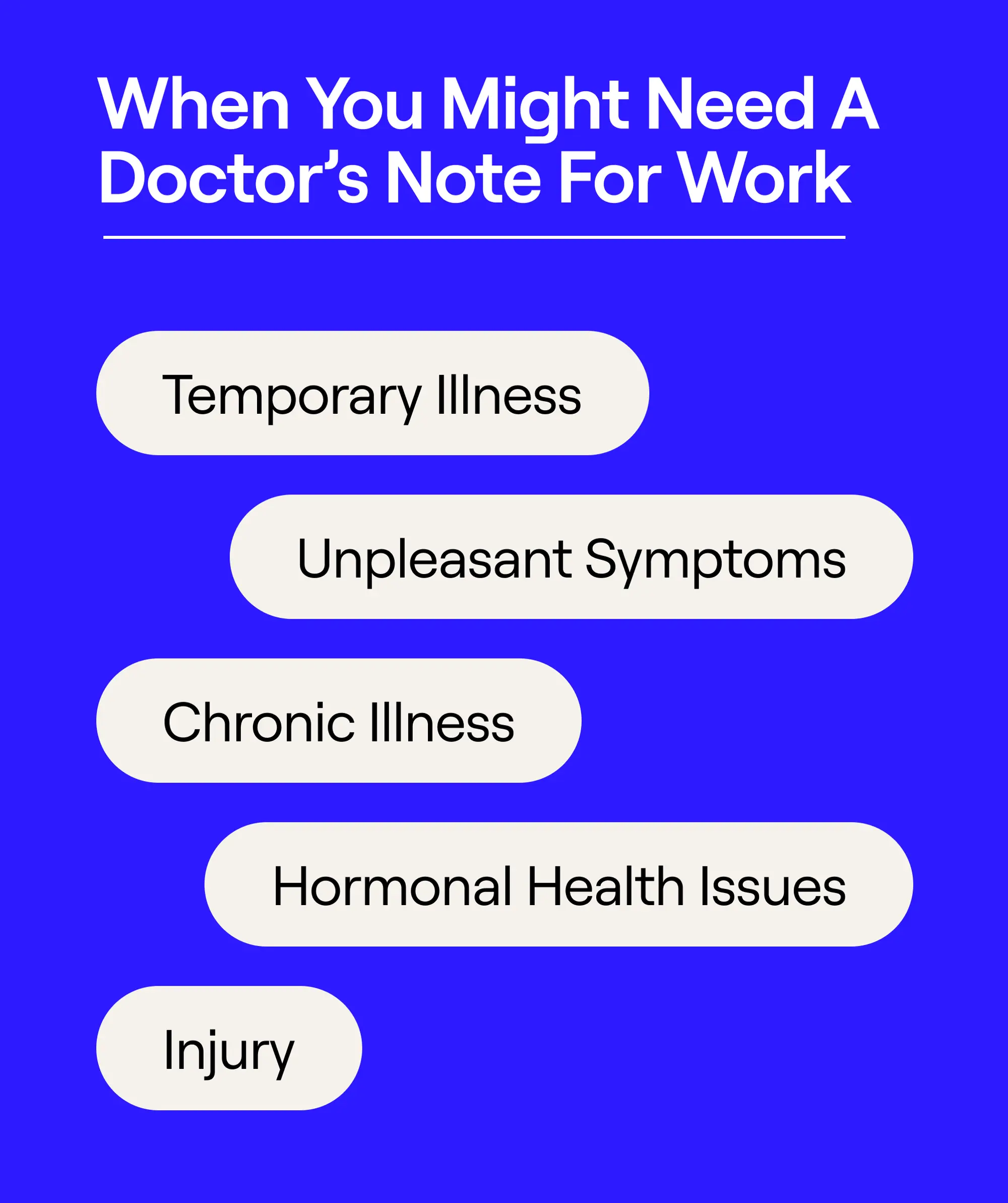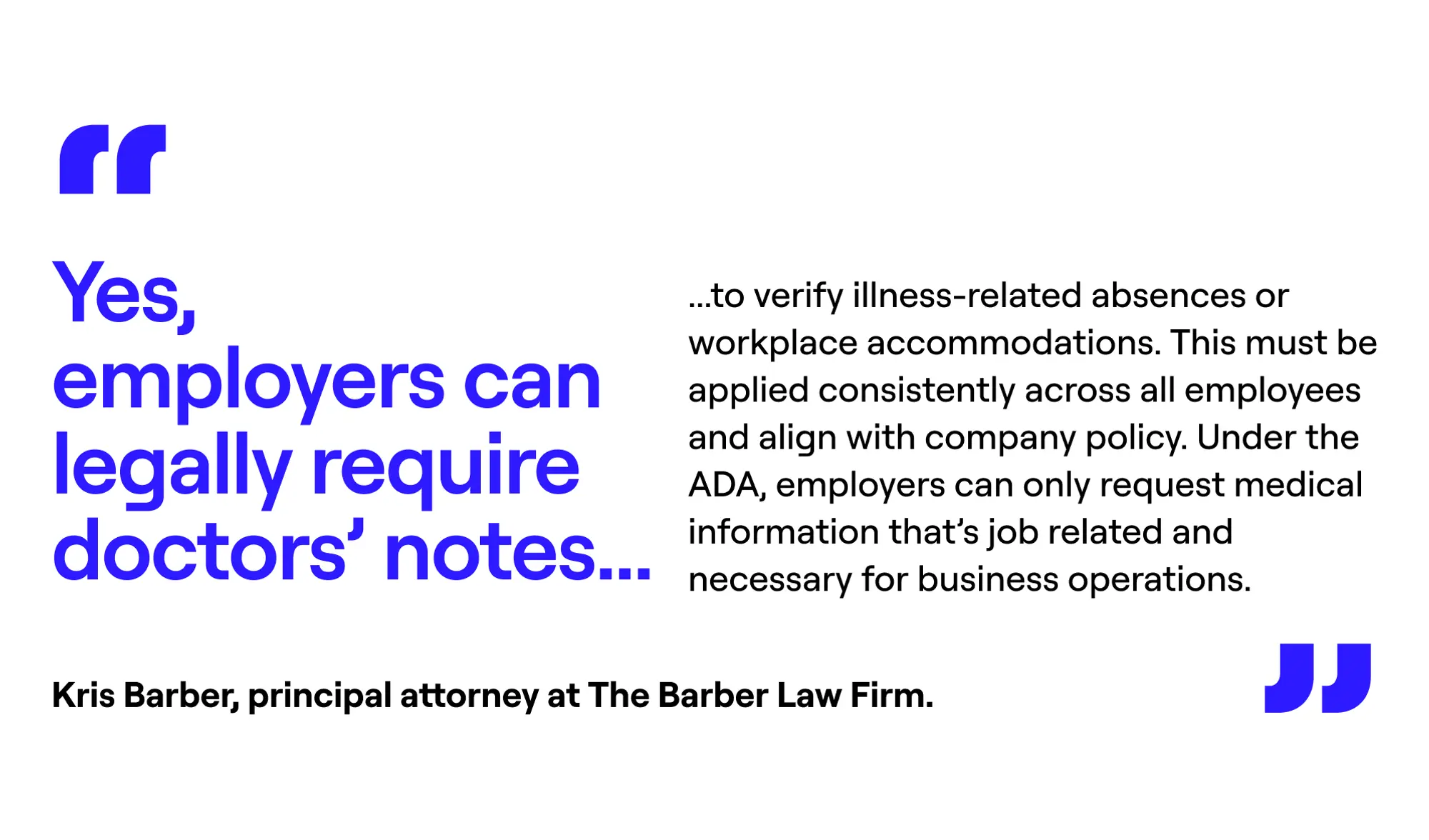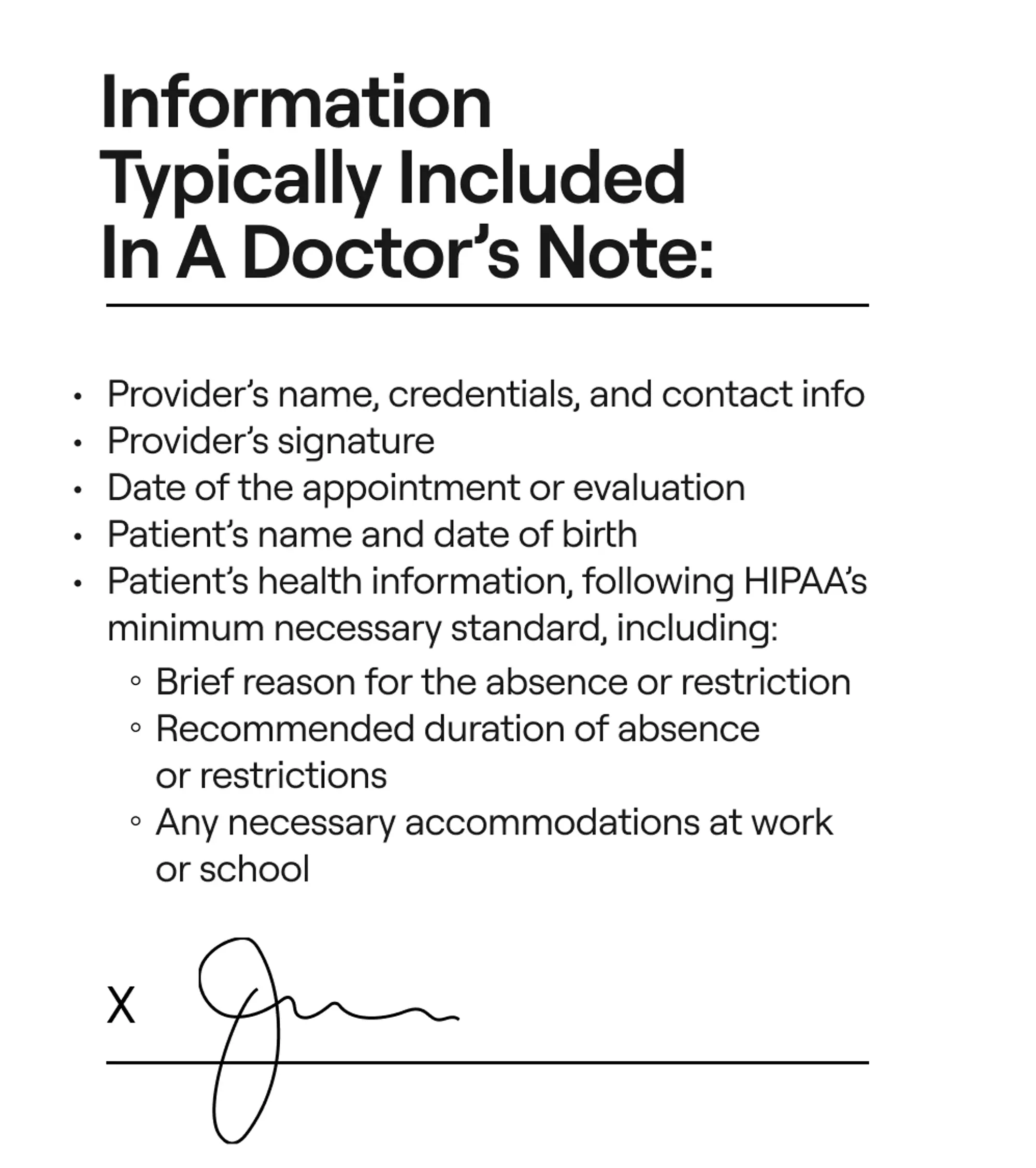Jun. 23, 2025
How To Quickly Get a Legitimate Doctor’s Note for Work

Jump to
Book a visit
$25 typical copay
$100 without insurance
Get a legitimate doctor's note online today for work or school.
You may need a doctor’s note for work or for school to explain an absence related to illness, injury, or other medical concerns. Traditionally, this process has presented hurdles surrounding getting an appointment, traveling when not feeling well, and more. But nowadays, you can easily secure a legitimate doctor’s note via telehealth services without leaving the comfort of your home—especially when that’s the last thing you want to do.
If you’ve ever needed a doctor’s note for work to “prove” that you were indeed sick, injured—what have you—you know how frustrating the situation can be. Telehealth services, however, can take away the pain points of the process, making securing a legitimate note easy-peasy.
I’m now mostly a freelance journalist, so the main boss I must answer to is me. I went freelance nearly 15 years ago, and one of the reasons I did so was that, living with chronic illness, I was sick of having to justify sick absences despite always getting my work done in a timely manner.
I live with chronic migraine, and when my eye socket has a figurative ice pick in it and I’m vomiting like I’m starring in my own personal Exorcist movie, the last thing I want to do is drive myself to a doctor to obtain a piece of paper or PDF. With the medicationsI take for attacks, driving is ill-advised and dangerous. During my days of working a salaried role at a company, if I’d been feeling well enough to leave the house in the first place, I’d have gone to work.
“Countless companies still require a medical note to verify absences, even for minor issues,” says Adam Carewe, MD. “The traditional process involves finding a clinic, booking an appointment, commuting, and waiting, which makes something simple unnecessarily hard. This is especially difficult when you’re already sick or injured.”
Yes, getting a doctor’s note is easy if you’re already at the clinic or hospital. You just have to ask. But not every illness or ailment requires in-person clinician treatment, yet you might still need to miss work or school. A chronic-illness flare-up for which you already have an at-home treatment protocol—like I have for migraine—is a clear example.
But so are viruses like the common cold or a mild case of the seasonal flu. I don’t know about you, but I feel weird being at a clinic when I’ve got the sniffles and could infect someone else—especially if I really don’t need to be on the exam table for my condition.
As you can see, getting a bona fide excuse for your work absence can be a hassle, but telehealth services, such as our team at General Medicine, have changed the process, making getting a legit doctor’s note online—without leaving the comfort of your bed or sofa—a cinch.
In this article, we’ll cover reasons you might need a doctor’s note for work, your rights, the fastest ways to get a note, how telehealth services work, and more. Let’s dive in.
When you might need a doctor’s note for work
You might need to present a doctor’s note to your work or school for several reasons. Here are a few scenarios.

Illness or injury absence justification
Some employers and educators will require a doctor’s note for absences related to illness or injuries.
Temporary illness
You might develop the common cold, seasonal flu, COVID-19, or another respiratory infection that warrants staying home, not only to recover but also to avoid infecting others.
Unpleasant symptoms
Our bodies are complex, and they don’t always cooperate. Occasionally something goes awry that makes going to work or school complicated. For example, might be experiencing gastrointestinal symptoms, such as diarrhea, vomiting, constipation, acid reflux, etc., that are uncomfortable or necessitate staying near a loo.
Chronic illness
If you’re in the not-so-fun chronic illness club, you might have recurrent flares of your condition that require you to temporarily rest for a few days and take care of yourself. Examples include inflammatory bowel disease (IBD), asthma, chronic obstructive pulmonary disease (COPD), Ehlers-Danlos syndrome (EDS), migraine, fibromyalgia, rheumatoid arthritis (RA), or an autoimmune disorder—just to name a few.
Injury
I don’t know about you, but I’m not the most graceful person on the planet. My accident-prone self has had to stay home a time or two or—let’s just not count—to recover from a random injury. You could incur an injury from working in the yard or doing a sporting activity. Or—for those of us over 40-ish—just sneezing wrong and “throwing out” your back can cause pain. Hey, it happens.
Hormonal health issues
Let’s not forget that premenstrual syndrome (PMS) or its more severe form premenstrual dysphoric disorder (PMDD) can leave you glued to your bedsheets. Some advocates argue that workplaces should instate menstrual leave policies.
Some chronic conditions affecting reproductive organs and related to hormonal health, such as endometriosis, adenomyosis, and polycystic ovary syndrome (PCOS), can also flare, requiring you to stay home. And perimenopause and menopause symptoms can impact your ability to attend work or school in the short term.
Work- or school-related restrictions or accommodations
If you’ve had an injury or temporary illness, or if you have a chronic illness, mental health issue, or a learning disability, or are neurodivergent, you may have certain work- or school-related restrictions or require accommodations.
For example, if you’ve broken your arm and normally operate some type of machinery, your employer may require a doctor’s note to show why you cannot perform all your usual functions, though you may still be able to attend work and complete some of your regular responsibilities.
In some cases, you may need ongoing accommodations. Under the Americans with Disabilities Act (ADA), employers are required to provide reasonable accommodations for their employees with disabilities.
For example, people with chronic migraine may need to work in spaces without fluorescent lights, which can trigger attacks. Sometimes people who are neurodivergent may need to wear noise-canceling headphones to prevent sensory overload or distractions. To receive these accommodations, your employer may require documentation, including a letter from your doctor.
Verification for sick-leave policies
Additionally, you may need to take Family and Medical Leave (FMLA) and need to provide justification for your request in the form of a doctor’s note.
For example, maybe you are experiencing a more severe flare of a chronic condition, have a cancer diagnosis requiring lengthy treatment, or need a procedure that warrants a longer recovery. In these cases, you may have an extended absence of several weeks to up to a few months. Or maybe you must care for a family member, such as a child with an ongoing illness.
Understanding your rights: Doctor’s notes and employment law
You may be wondering if your employer can legally require you to get a doctor’s note.
“Yes, employers can legally require doctors’ notes to verify illness-related absences or workplace accommodations,” says Kris Barber, principal attorney at The Barber Law Firm. “This must be applied consistently across all employees and align with company policy. Under the ADA, employers can only request medical information that’s job related and necessary for business operations.”
The doctor providing your note must follow rules for the Health Insurance Portability and Accountability ACT (HIPAA), a law that protects the privacy and security of your health information.

“HIPAA protects patient information between healthcare providers and patients, but doesn’t directly govern employer-employee relationships,” Barber explains. “Doctor’s notes must follow the ‘minimum necessary standard,’ containing only essential information like dates of treatment and work restrictions. Employers cannot contact doctors directly without written employee consent.” However, they can contact a medical professional listed on a note to verify the note’s authenticity.
While you may need to provide a doctor’s note to your employer, your employer is limited in what they can ask, and you have privacy rights about what you disclose.
“Employers can ask whether an employee can perform essential job functions and if accommodations are needed,” Barber says. “They cannot ask for specific diagnoses, treatment details, or family medical history.”
Questions must be limited to considerations about work capacity and safety. “For example,” Barber says, “asking, 'Can you lift 50 pounds?' is acceptable, but 'What’s your medical condition?' is not. The focus should always be on job performance, not medical details.”
Fastest ways to get a doctor’s note
You’ve got several options when obtaining a doctor’s note. If you’re already established with a care team at a clinic or hospital network, you may be able to get a doctor’s note through them. Other options include going to a walk-in clinic, visiting an urgent care facility, or using a telehealth service.
Your regular care team
If you have a primary care physician or a specialist you see regularly, they can provide you a doctor’s note. They may require you to visit the clinic for an evaluation, or you may simply be able to request a note online or over the phone.
As an example, I teach a few classes as an adjunct professor. During the COVID-19 pandemic, I wanted to teach from home to reduce potential exposure to the virus, since I have severe asthma and take immune system-modifying medications. My university required a doctor’s recommendation for this accommodation. I simply sent a message to my doctor through my virtual patient portal and received an online doctor’s note back within a day—all without having to go anywhere.
I had just recently had an appointment with my immunologist, so he did not require a visit in-person or online. However, some physicians may require this, depending on your individual situation.
The emergency room, urgent care, or a walk-in clinic
Emergency room
If you’re experiencing a serious medical emergency, you should dial 911 or go to the nearest emergency room. ER physicians and care teams can provide you a doctor’s note for any related absences. They may outright offer you one, or you may have to ask for it upon your discharge.
Urgent care or walk-in clinic
If you are experiencing a more minor situation that requires medical attention—such as a urinary tract infection (UTI), sprained ankle, superficial wound, etc.—you might choose to go to a nearby urgent care or walk-in clinic.
These are different facilities in that urgent care centers may have more robust diagnostic tools available on site, such as lab tests and X-ray machines, when compared with walk-in clinics. Urgent care clinics also have doctors on site, whereas some walk-in clinics may be run by nurse practitioners or physician assistants. However, these clinicians can still provide doctor’s notes.
Telehealth services
You may find telehealth to be a convenient option, as well. These all operate in different ways, depending on the service you use. The basic process often includes scheduling an online visit (which may include messaging or a video consultation) and then asking for a doctor’s note. Some telehealth services have near-instant availability, while others may require waiting a few hours or more for your consultation.
You may be curious when to get a walk-in clinic, telehealth, or urgent care doctor’s note. The notes themselves will be relatively the same, so the choice depends on the type of care you need.
“In reality,” Dr. Carewe says, “both telehealth and urgent care can handle about 95% of the same concerns, especially with a platform like General Medicine. The key difference is speed and convenience. A prompt telehealth visit, or even our quick SMS-based clinician triage, is almost always a faster and more efficient option than going to urgent care.”
As long as you aren’t experiencing a serious medical emergency, you can always start with telehealth if it’s most convenient for you. If you need care that goes beyond what telehealth can provide, your clinician can offer guidance on your next steps.
How online doctor’s notes work
Is your telehealth doctor’s note legit? That depends. “A legitimate doctor’s note must come from a licensed clinician following a real medical evaluation, whether it happens in person or virtually,” Dr. Carewe says. Your appointment might also happen through secure asynchronous messaging.
Information typically included in a doctor’s note:
- Provider’s name, credentials, and contact info
- Provider’s signature
- Date of the appointment or evaluation
- Patient’s name and date of birth
- Patient’s health information, following HIPAA’s minimum necessary standard, including:
- Brief reason for the absence or restriction
- Recommended duration of absence or restrictions
- Any necessary accommodations at work or school

Many online doctor’s notes are in the form of a PDF or a scanned image. You should receive your note through a secure patient portal, and then you’ll have the option to download and share your note with your employer or school, either via email or as a printed version.
How to request and receive your doctor’s note online with General Medicine
How does the process work with General Medicine? “We follow specific clinical guidelines and guardrails for issuing notes, which are intended for acute, intermittent absences from work or school due to illness or injury,” Dr. Carewe says. “What makes a note legitimate is not the format, but the integrity of the clinical process and documentation behind it. We make that process fast, clear, convenient, and fully professional.”
First, sign up on the General Medicine website and request your consultation appointment.
“At General Medicine,” Dr. Carewe says, “Every note is written by a credentialed provider after a documented visit, either through video or asynchronous messaging.”
After the appointment, your visit info and a PDF of a doctor’s note get stored in your General Medicine medical records. “Notes and the visit care plan are delivered through SMS using secure links and can also be sent via email upon request,” Dr. Carewe adds.
For accommodation requests, General Medicine will set patients up with in-person primary care or other specialists to manage these needs. General Medicine does not support FMLA requests at this time.
"I appreciated that I could talk to someone through text and still get what I needed without a lot of trouble. I was able to use General Medicine directly from my bed rather than having to go into a doctor's office while being sick.”
—Sara, from Ohio
“You spent more time with me than the providers I’ve waited months for. It was remarkable how different my provider was than any in person doctor I've seen.”
— Megan, from California
“It was super easy and super convenient. You can chat with a doctor without even putting shoes on to leave the house.”
— Sarah, from South Carolina
Cost considerations
Doctor’s notes themselves are free. But to get one, you typically need to undergo a visit or consult with a licensed medical professional. That appointment or service may cost you a fee, depending on your health insurance coverage.
Generally, you will be charged your insurance co-payment. Copays vary based on your insurance provider, but they generally range from $26 to $44. You may also have a coinsurance rate, which is the percentage of the covered amount, usually about 20%.
Dr. Carewe explains the costs with General Medicine. “For a video visit with insurance, patients typically only pay their insurance copay, which is often $25 or less,” he says. “For those without insurance or choosing a fully asynchronous visit for a work or school note, we offer a low fixed cash price.”
He adds, “There’s no subscription required, and everything is clearly priced upfront based on your active insurance. We also include a work or school note with any type of booked visit at no extra charge. There are no hidden fees or add-ons. Whether you’re using coverage or paying out of pocket, General Medicine makes it fast, affordable, and easy to get what you need.”
Key takeaways
- Some employers and educational institutions require a doctors’ note for absences for illness or injury or for restrictions or accommodations.
- Getting a doctor’s note the traditional way, which involves physically going to a doctor, can be a hassle when you’re not feeling well.
- Telehealth services, such as General Medicine, offer fast and easy ways of obtaining a legitimate doctor’s note without having to leave your house.
- A legitimate doctor’s note must include specific information, follow HIPAA privacy laws, and more.
General Medicine follows a strict editorial process, including using real experts to write our articles, vetted primary sources, fact-checking, a secondary medical review, and updates as necessary. This article was medically reviewed and fact checked by Pallabi Sanyal-Dey, MD, and Poushali Bhattacharjee, MD.
FAQ
Can I get a sick note without seeing the doctor?
You can get a sick note without seeing a doctor in person; however, you will still need to reach out to your current doctor or a telehealth service for an appointment with a licensed medical professional. The appointment may occur as a video visit or even through a secure chat service.
How to write a doctor’s note for work?
As a patient, you cannot write a doctor’s note for yourself. You can request a doctor’s note by communicating with your regular care team, visiting a walk-in clinic or urgent care center, or by using a telehealth service. If you are in the emergency room for a medical emergency, the ER can also issue you a doctor’s note upon your discharge.
How many days before I need a sick note?
Employer and school rules surrounding the need for doctor’s notes for absences will vary. Check with your individual employer or school for their specific requirements.
Can employers verify the legitimacy of a doctor’s note?
Yes, your employer or educational institution has certain options for verifying the legitimacy of a doctor’s note. They can call the doctor or clinic listed on the note to verify that the doctor did indeed issue the note and that the information on the note matches what was provided. However, they cannot press for more details or receive additional medical information without your written consent.
Is an online doctor’s note as valid as an in-person note?
Yes, an online doctor’s note is just as valid as an in-person note, provided that a licensed medical professional issued you the note after a consultation with you.
What if my employer refuses to accept my doctor’s note?
As long as your doctor’s note contains the basic information required, your employer or school should accept the note. If for any reason your employer or school refuses to accept your doctor’s note, you have a few options. First, ask why? You may need to review your company’s or schools policies on doctor’s notes to ensure yours complies. Ensure the note contains all the necessary information. If it meets these requirements, then consult your human resources department about the issue. If HR cannot help you resolve the issue, you may need to consult a lawyer.
Our editorial standards
At General Medicine, we cut through the clutter to make health care clearer, faster, and easier to navigate. Every article is grounded in evidence-based research and peer-reviewed journals, reviewed by medical professionals, and written in accessible language that helps you make health decisions with confidence. We’re committed to ensuring the quality and trustworthiness of our content and editorial process by providing information that is up-to-date, accurate, and actually useful. For more details on our editorial process, see here.



